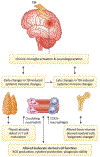Bidirectional Brain-Systemic Interactions and Outcomes After TBI
- PMID: 33495023
- PMCID: PMC8084884
- DOI: 10.1016/j.tins.2020.12.004
Bidirectional Brain-Systemic Interactions and Outcomes After TBI
Abstract
Traumatic brain injury (TBI) is a debilitating disorder associated with chronic progressive neurodegeneration and long-term neurological decline. Importantly, there is now substantial and increasing evidence that TBI can negatively impact systemic organs, including the pulmonary, gastrointestinal (GI), cardiovascular, renal, and immune system. Less well appreciated, until recently, is that such functional changes can affect both the response to subsequent insults or diseases, as well as contribute to chronic neurodegenerative processes and long-term neurological outcomes. In this review, we summarize evidence showing bidirectional interactions between the brain and systemic organs following TBI and critically assess potential underlying mechanisms.
Keywords: bidirectional; microglia; neuroinflammation; systemic; traumatic brain injury.
Copyright © 2021 Elsevier Ltd. All rights reserved.
Conflict of interest statement
Declaration of Interests The authors declare no competing financial interests in relation to this work.
Figures


References
-
- McDonald SJ, et al. (2020) Beyond the Brain: Peripheral Interactions after Traumatic Brain Injury. J Neurotrauma 37, 770–781 - PubMed
-
- (2018) Corrections. Lancet Neurol 17, 203. - PubMed
-
- Hazelton I, et al. (2018) Exacerbation of Acute Traumatic Brain Injury by Circulating Extracellular Vesicles. J Neurotrauma 35, 639–651 - PubMed
Publication types
MeSH terms
Grants and funding
LinkOut - more resources
Full Text Sources
Other Literature Sources
Medical

